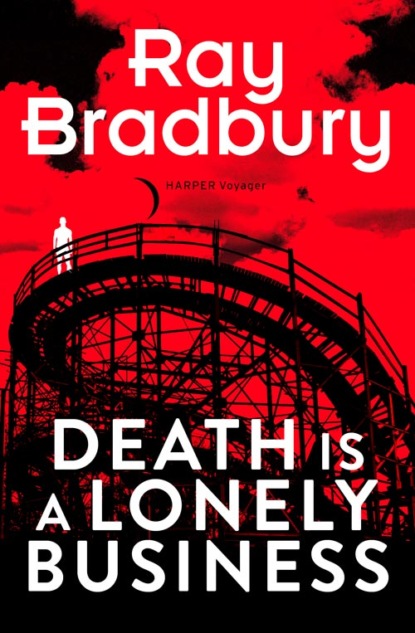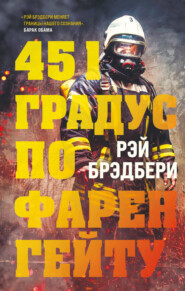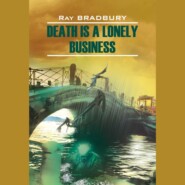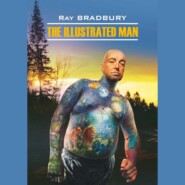По всем вопросам обращайтесь на: info@litportal.ru
(©) 2003-2024.
✖
Death is a Lonely Business
Настройки чтения
Размер шрифта
Высота строк
Поля
“Been gone three months. Might as well be three years,” I said. “Christ, I’m lonely.”
“And vulnerable,” said Fannie. “Shouldn’t you call her?”
“Christ, Fannie, I can’t afford. And I don’t want to reverse the charges. I’ll just have to hope she’ll phone me in the next day or so.”
“Poor boy. Sick with love.”
“Sick with death. The awful thing is, Fannie, I didn’t even know that old man’s name! And isn’t that a shame?”
The second side of Tosca really did it. I sat there, head down, with the tears running off the tip of my nose into the wine.
“You’ve ruined your St. Emilion,” said Fannie gently, when the record ended.
“Now I’m mad,” I said.
“Why?” Fannie, standing, like a great pomegranate mother, by the phonograph, sharpened a new needle and found a happier record. “Why?”
“Someone killed him, Fannie. Someone stuffed him in that cage. There was no other way for him to have gotten in.”
“Oh, dear,” she murmured.
“When I was twelve, one of my uncles back east was shot in a holdup late at night, in his car. At his funeral, my brother and I vowed we’d find the murderer and do him in. But he’s still in the world somewhere. And that was a long time back in another town. This time, it’s here. Whoever drowned the old man lives within a few blocks of me in Venice. And when I find him—”
“You’ll turn him over to the police.” Fannie leaned forward in one massive but tender motion. “You’ll feel better after a good sleep.”
Then she read my face.
“No,” she said at my funeral, “you won’t feel better. Well, go on. Be the fool all men are. God, what lives we women lead, watching the fools kill each other and the killers loll the killers, and us over on the sidelines yelling stop and nobody listening. Can’t you hear me, love?”
She put another record on and let the needle down like a loving lass to the grooves, and came surging over to touch my cheek with her great pink chrysanthemum fingers.
“Oh, please, do be careful. I don’t like Venice. Not enough streetlights. And those damned oil wells pumping all night long, no letup, with a case of the moans.”
“Venice won’t get me, Fannie, or whatever it is wandering around Venice.”
Standing in halls, waiting, I thought, outside old men’s and old women’s doors.
Fannie became a giant glacier standing over me.
She must have seen my face again, where everything was given away, nothing hidden. Instinctively, she glanced at her own door, as if a shadow had passed outside. Her intuition stunned me.
“Whatever you do”—her voice was lost deep down in hundreds of pounds of suddenly haunted flesh—“don’t bring it here.”
“Death isn’t a thing you can bring with you, Fannie.”
“Oh, yes it is. Scrape your feet before coming in downstairs. Do you have money to get your suit dry-cleaned? I’ll give you some. Shine your shoes. Brush your teeth. Don’t ever look back. Eyes can kill. If you look at someone, and they see you want to be killed, they tag alone. Come here, dear boy, but wash up first and look straight ahead.”
“Horsefeathers, Fannie, and hogwash. That won’t keep death away and you know it. Anyway, I wouldn’t bring anything here to you but me; lots of years, Fannie, and love.”
That melted the snow in the Himalayas.
She turned in a slow carousel motion. Suddenly we both heard the music that had long since started on the hissing record.
Carmen.
Fannie Florianna sank her fingers into her bosom and seized forth a black-lace fan, flitted it to full blossom, flirted it before her suddenly flamenco eyes, shut her lashes demurely, and let her lost voice spring forth reborn, fresh as cool mountain water, young as I had felt only last week.
She sang. And as she sang, she moved.
It was like watching the heavy curtain lift daintily high at the Metropolitan to be draped around the Rock of Gibraltar and whirled at the gesturings of a maniac conductor who knew how to electrify elephant ballets and call spirit-spout white whales from the deeps.
By the end of the first song, I was crying again.
This time, with laughter.
Only later did I think to myself, my God. For the first time. In her room. She sang.
For me!
Downstairs, it was afternoon.
I stood in the sunlit street, swaying, savoring the aftertaste of the wine, looking up at the second floor of the tenement.
The strains sounded of the song of farewell; the leave-taking of Butterfly by her young lieutenant, all in white, sailing away.
Fannie loomed on her porch, looking down at me, her little rosebud mouth smiling sadly, the young girl trapped in her round harvest-moon face, letting the music behind her speak our friendship and my leave-taking for now.
Seeing her there made me think of Constance Rattigan locked away in her Moorish fort by the sea. I wanted to call up and ask about the similarity.
But Fannie waved. I could only wave back.
I was ready for Venice in clear weather now.
Little balding man who doesn’t look like a detective—Elmo Crumley, I thought, here I come!
But all I did was loiter in front of the Venice Police Station feeling like a gutless wonder.
I couldn’t decide whether Crumley was Beauty or the Beast inside there.
Such indecision made me ache out on the sidewalk until someone who looked like Crumley glanced out of an upstairs jail window.
I fled.
The thought of him opening his mouth like a blowtorch to scorch the peach fuzz on my cheeks made my heart fall over like a prune.
Christ, I thought, when will I face up to him at last to unload all the dark wonders that are collecting like tombstone dust in my manuscript box? When?
Soon.

















